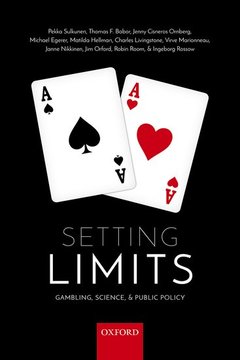Description
Setting Limits
Gambling, Science and Public Policy
Authors: Sulkunen Pekka, Babor Thomas F., Cisneros Ornberg Jenny, Egerer Michael, Hellman Matilda, Livingstone Charles, Marionneau Virve, Nikkinen Janne, Orford Jim, Room Robin, Rossow Ingeborg
Language: English
Subjects for Setting Limits:
61.80 €
In Print (Delivery period: 21 days).
Add to cart
Publication date: 12-2018
256 p. · 15.5x23.7 cm · Paperback
256 p. · 15.5x23.7 cm · Paperback
Description
/li>Biography
/li>
Commercial gambling is a recent historical phenomenon. It has developed into a profitable industry that supplies a range of recreational activities to its customers, and is a significant way of collecting money from players to distribute to companies, state budgets, and other beneficiaries. Many of these are civil society organizations, using the money for producing services in sports, culture, social work, and health care. However, gambling can also develop into pathological behaviour. Using a public interest framework, this book discusses the policies that will best serve the public good and minimize individual and collective harms. After describing the historical context of the gambling and the current global burden of the activity, available methods of regulating the industry are evaluated using the available scientific evidence. By analysing the effectiveness of gambling policies and their alignment with the public interest, the epidemiological obstacles to successful regulation are considered in detail. There is good evidence for the effectiveness of restrictions on availability and access, but preventing gambling-related harm is not possible without limiting the overall volume of the activity, and hence the profits for the gambling industry and governments. Taking an international approach, this book delivers a comprehensive review of the epidemiological evidence documenting the harmful effects of gambling on individuals, communities, and societies. Essential reading for policymakers, social and behavioural scientists in gambling research, and public health researchers, Setting Limits examines a global view of an emerging epidemic of gambling problems.
Pekka Sulkunen, PhD, Professor Emeritus and former Director, Centre for Research on Addiction, Control and Governance (CEACG), Department of Social Research, University of Helsinki, Finland Thomas F. Babor, PhD, MPH, Professor and Chairman, Department of Community Medicine, University of Connecticut School of Medicine Connecticut, United States of America Thomas F. Babor, PhD, MPH, Professor and Chairman, Department of Community Medicine, University of Connecticut School of Medicine Connecticut, United States of America Michael Egerer, PhD, Researcher, Centre for Research on Addiction, Control and Governance (CEACG), Department of Social Research, University of Helsinki, Finland Matilda Hellman, PhD, Adjunct Professor (title of docent), Director, Centre for Research on Addiction, Control and Governance (CEACG); Department of Social Research; University of Helsinki, Finland Charles Livingstone, PhD, Senior Lecturer, School of Public Health and Preventive Medicine, Monash University, Melbourne, Australia Virve Marionneau, PhD, Researcher, Centre for Research on Addiction, Control and Governance (CEACG), Department of Social Research, University of Helsinki, Finland Janne Nikkinen, Docent in Social Ethics, Researcher, Centre for Research on Addiction, Control and Governance (CEACG), Department of Social Research, University of Helsinki, Finland Jim Orford, PhD, Professor Emeritus of Clinical and Community Psychology, University of Birmingham, United Kingdom Robin Room, PhD, Professor, Centre for Social Research on Alcohol and Drugs, Stockholm University, Sweden; Professor, Centre for Alcohol Policy Research, La Trobe University, Melbourne, Australia Ingeborg Rossow, PhD, Norwegian Institute of Public Health, Oslo, Norway
© 2024 LAVOISIER S.A.S.

